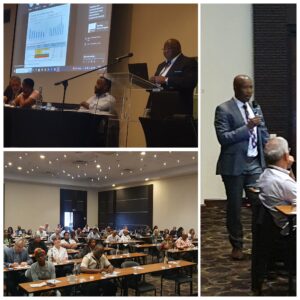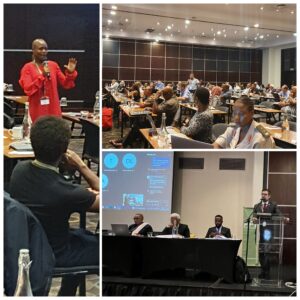The African Procurement Law Unit (APLU), which is housed at the Stellenbosch University (SU) Law Faculty, initiated a national conversation on public procurement reform in South Africa during a two-day gathering in Johannesburg from 27 to 28 February 2023.
The initiative is a response to the call of the Zondo Commission of Inquiry into State Capture, which noted that “any serious attempt to address the problems which beset public procurement must go well beyond state capture … the process of reform requires a coherent and comprehensive plan of action which needs to bring the public and private sectors together in a joint initiative to restore proper standards and discipline within the procurement system.”
The event drew over 120 delegates from the South African public procurement/supply chain management community to discuss all aspects of public procurement with the aim of framing a vision for the future of public procurement in South Africa. Delegates came from all levels of government, including key national departments such as Treasury; Justice and Constitutional Development; Public Works and Infrastructure; Trade, Industry and Competition and Defence; as well as from public bodies such as the NRF; Public Service Commission; SARS; Competition Commission; and SANRAL. Suppliers to the government as well as supplier organisations, such as Consulting Engineers South Africa and the Steel and Engineering Industries Federation of Southern Africa, were present. Participating NGOs included Corruption Watch; the Legal Resources Centre; Amabhungane; Open Ownership; OUTA and the Public Service Accountability Monitor; as well as some of South Africa’s leading procurement academics and lawyers.
The topics discussed ranged from the forthcoming public procurement legislation for South Africa; how best to deal with the restriction of poor performing and corrupt suppliers to government; the liability of public officials for procurement failures; the need for the state to buy local goods in order to support local industrial development; how to accelerate transformation via public procurement practices; increased use of technology to improve efficiencies in procurement and to reduce abuse; and how best to deal with challenges to tender awards.
Prof Geo Quinot, APLU director and professor of law at SU, noted in his opening remarks that “public procurement is the backbone of service delivery in our country, of making real the aspirations of our constitution, of driving economic development. By coming together, all of us can strengthen that backbone to the benefit of everyone who live in our country.”
The issues raised during the plenary engagements were categorised under five themes and discussed in more detail by smaller working groups. The themes include institutional arrangements; procurement integrity; targeted procurement; procedures and efficiency; and dispute resolution. The South African public procurement community intends to contribute to the ongoing reforms of the public procurement system and following the two-day workshop, the national conversation continues by way of workstreams where delegates will continue to explore the themes raised in the working groups. For each theme, an issue paper will be collaboratively developed to set out, inter alia, the nature of the issue; its role in the procurement system; possible ways in which it could be regulated; suggested operating procedures and standard documents; and the skills required to manage the issue. The issue papers will include case studies, from South Africa and beyond, on how the issue has been successfully addressed. These issue papers will be discussed at further gatherings, including another national workshop in June. The outcomes can feed into the public consultation processes that will accompany new procurement legislation, and the crafting of regulations and other implementation instruments under a new procurement statute, once passed. Generally, the initiative aims to assist all stakeholders in improving procurement practice – from the regulators tasked with designing and overseeing the procurement system; to the leadership of organs of state in using procurement as a strategic tool; to procurement officials in their daily acquisition functions; to businesses wanting to supply goods and services; to the state.
The South African procurement community believes that by bringing together the experiences of officials awarding tenders; enterprises selling to the state; regulators monitoring the spending of public money; NGOs focusing on the impact of procurement on civil society; and academics researching and training on all aspects of public procurement, the South African society can collaboratively construct a fit-for-purpose procurement system that can deliver best value for money.
(Afrikaans volg)
Die African Procurement Law Unit (APLU), wat by die Universiteit Stellenbosch (US) Regsfakulteit gehuisves word, het ‘n nasionale gesprek oor hervorming van staatsverkryging in Suid-Afrika tydens ‘n tweedaagse byeenkoms in Johannesburg van 27 tot 28 Februarie 2023 gefasiliteer.
Die inisiatief is ‘n reaksie op die oproep van die Zondo-kommissie van ondersoek na staatskaping wat opgemerk het dat “any serious attempt to address the problems which beset public procurement must go well beyond state capture … the process of reform requires a coherent and comprehensive plan of action which needs to bring the public and private sectors together in a joint initiative to restore proper standards and discipline within the procurement system.”
Die geleentheid het meer as 120 afgevaardigdes van die Suid-Afrikaanse staatsverkryging/voorsieningskettingbestuursgemeenskap getrek om alle aspekte van staatsverkryging te bespreek met die doel om ‘n visie vir die toekoms van staatsverkryging in Suid-Afrika te formuleer. Afgevaardigdes het van alle regeringsvlakke gekom, insluitend sleutel nasionale departemente soos die Tesourie; Justisie en Grondwetlike Ontwikkeling; Openbare Werke en Infrastruktuur; Handel, Nywerheid en Mededinging, en Verdediging asook van openbare liggame soos die NNS; Staatsdienskommissie; SARS; Mededingingskommissie en SANRAL. Verskaffers aan die regering sowel as verskaffersorganisasies soos Consulting Engineers South Africa en die Steel and Engineering Industries Federation of Southern Africa was teenwoordig. Deelnemende NRO’s het ingesluit Corruption Watch; die Legal Resources Centre; Amabhungane; Open Ownership, OUTA en die Public Service Accountability Monitor sowel as van Suid-Afrika se voorste verkrygingsakademici en -regspraktisyns.
Die onderwerpe wat bespreek is, het gewissel van die komende staatsverkrygingswetgewing vir Suid-Afrika, hoe om die uitsluiting van swak presterende en korrupte verskaffers aan die regering die beste te hanteer, die aanspreeklikheid van staatsamptenare vir verkrygingsmislukkings, die behoefte vir die staat om plaaslike goedere te koop ten einde plaaslike nywerheidsontwikkeling te ondersteun, hoe om transformasie deur staatsverkrygingspraktyke te versnel, groter gebruik van tegnologie om doeltreffendheid in staatsverkryging te verbeter en om misbruik te verminder en hoe om besware op tendertoekennings die beste te hanteer.
Prof Geo Quinot, APLU-direkteur en professor in regte aan die US, het in sy openingstoespraak opgemerk dat “staatsverkryging die ruggraat is van dienslewering in ons land, om die aspirasies van ons Grondwet waar te maak, om ekonomiese ontwikkeling aan te dryf. Deur saam te werk, kan almal van ons daardie ruggraat versterk tot voordeel van almal wat in ons land woon.”
Die kwessies wat tydens die plenêre besprekings na vore gekom het, is onder vyf temas gekategoriseer en in meer besonderhede deur kleiner werkgroepe bespreek. Die temas is institusionele reëlings; verkrygingsintegriteit; geteikende verkryging; prosedures en doeltreffendheid; en dispuutbeslegting. Die Suid-Afrikaanse staatsverkrygingsgemeenskap beoog om by te dra tot die voortgesette hervormings van die staatsverkrygingstelsel en na aanleiding van die tweedaagse werkswinkel, gaan die nasionale gesprek voort by wyse van werkstrome waar afgevaardigdes sal voortgaan om die temas wat in die werkgroepe geopper is, te verken. Vir elke tema sal ‘n besprekingsdokument saam ontwikkel word om onder meer die aard van die kwessie, die rol daarvan in die verkrygingstelsel, moontlike maniere waarop dit gereguleer kan word, voorgestelde bedryfsprosedures en standaarddokumente uiteen te sit, asook die vaardighede wat benodig word om die kwessie te bestuur. Die besprekingsdokumente sal gevallestudies van binne en buite Suid-Afrika insluit oor hoe die kwessie suksesvol aangespreek is. Hierdie besprekingsdokumente sal by verdere byeenkomste bespreek word, insluitend nog ‘n nasionale werkswinkel in Junie. Die uitkomste kan ingevoer word in die openbare konsultasieprosesse wat nuwe verkrygingswetgewing sal vergesel, en die opstel van regulasies en ander implementeringsinstrumente onder ‘n nuwe verkrygingswet, sodra dit aanvaar is. Oor die algemeen is die inisiatief daarop gemik om alle belanghebbendes te help met die verbetering van staatsverkrygingspraktyk – van die reguleerders wat getaak is om die verkrygingstelsel te ontwerp en toesig te hou; tot die leierskap van staatsorgane in die gebruik van staatsverkryging as ‘n strategiese instrument; aan verkrygingsbeamptes in hul daaglikse verkrygingsfunksies; tot besighede wat goedere en dienste aan die staat wil lewer.
Die Suid-Afrikaanse staatsverkrygingsgemeenskap is van mening dat deur die ervaring van amptenare wat tenders toeken, van ondernemings wat aan die staat verkoop, van reguleerders wat die besteding van openbare geld moniteer, van NRO’s wat fokus op die impak van staatsverkryging op die burgerlike samelewing en van akademici wat navorsing en opleiding oor alle aspekte van staatsverkryging doen, byeen te bring, kan die Suid-Afrikaanse samelewing saam ‘n geskikte staatsverkrygingstelsel bou wat die beste waarde vir geld kan lewer.


